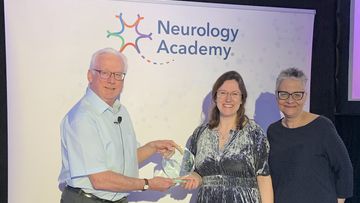Effectiveness of a PD clinic
This audit aimed to determine how many patients from clinic require hospital admission over the course of 12 months, the outcome of hospital admission, and whether admission was potentially avoidable, e.g. adequate assessment of non-motor symptoms at clinic.
Current guidelines specify that patients should be reviewed at an interval of 6-12 months, non-motor symptoms should be addressed including mental health, sleep disturbances, falls, autonomic disturbances, and patients should have access to other members of the MDT.
We identified 74 appointments in January 2014 for this audit. Fourteen of these patients were discharged from follow-up, 2 DNA, therefore 58 patients and case notes were reviewed for 12 months after clinic date. Over half of the patients were considered complex.
There was regular screening of motor and non-motor symptoms. The mean follow-up of PD patients was 18.1 weeks (±SD 7.3 weeks). The mean age of men was 77.2 years (±SD 6.3 years) and for women 78.1 years (SD ±8.9 years). The mean time since was 4.9 years (±SD 4.9 years), median 3 years (range 0-24 years).
We found no routine referral to PT/OT. Of the 58 patients we audited, 21 patients had at least one hospital admission in 12 months (1 admission (13), 2 admissions (3), 3 admissions (3), 5 admissions (1), 7 admissions (1). There was a total of 40 admissions (which included 2 deaths).
Looking at the clinic histories, the motor and non-motor symptoms addressed at clinic due to screening included: falls (20), swallowing problems (7), autonomic disturbance [orthostatic hypotension (9), constipation (6), urinary incontinence (3)], mental health [hallucinations (22), memory (8)], and sleep disturbances [REM (16), insomnia (6), daytime somnolence (6)].
We identified areas of good practice, such as the review frequency which was better than six monthly, and attention to both motor and non-motor symptoms. However, there was room for improvement around constipation which is an avoidable reason for hospital admission. We need to prescribe medication for constipation more routinely, and educate patients and carers about this issue. Furthermore falls were a common reason for admission and we need to ensure physiotherapy involvement early and consider problems with both under and over treating motor symptoms, as well as looking for other causes of falls e.g. heart block, in addition to PD.
More Parkinson's Academy Service development Projects

'The things you can't get from the books'
Parkinson's Academy, our original and longest running Academy, houses 23 years of inspirational projects, resources, and evidence for improving outcomes for people with Parkinson's. The Academy has a truly collegiate feel and prides itself on delivering 'the things you can't get from books' - a practical learning model which inspires all Neurology Academy courses.